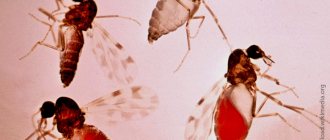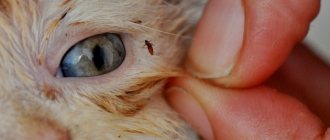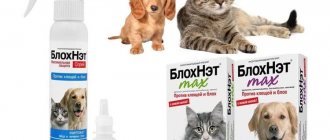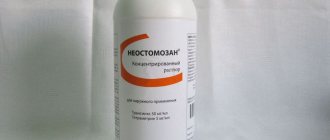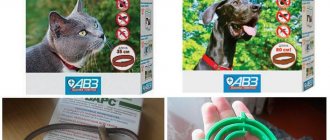Fleas are parasitic insects that live in the fur of animals. They cause itching, redness of the skin, and carry dangerous diseases. If a cat walks outside or in a garden plot, the pet must be regularly treated with insecticides (drops on the withers, flea collar). If the drug is not effective enough and infection occurs, the drops cannot be reused earlier than after 20-30 days. Flea shampoo for cats will help remove insects.
A cat living in an apartment that does not go outside and is not treated with flea medications can also become infected with parasites. Hosts and guests bring them from the street on the soles of their shoes. If one of the guests keeps animals at home or has recently interacted on the street with a cat on which parasites live, the risk of infection increases. But not so high as to buy drops, a flea collar or other long-lasting products. It would be more rational to use anti-flea shampoo and sanitize the apartment and cat’s bed.
Composition of flea detergent
Anti-flea shampoo for cats contains:
- water;
- foaming agents;
- oils, plant extracts, synthetic substances that improve the condition of the coat, making it soft, shiny, and easier to comb;
- essential oils of clove, lavender, citronella, which repel insects;
- insecticides that disrupt the life of parasitic insects, their larvae, and eggs.
The composition may contain dyes and fragrances that give the detergent a more pleasant appearance and smell.
Manufacturers produce anti-flea shampoos for cats with natural or synthetic insecticides. The former have a gentler effect and are safe for kittens, pregnant and lactating cats, while synthetic ones are more effective.
Causes of fleas in dogs
To reduce the risk of flea infestation, dog owners need to know where danger awaits their pets.
So, how can a dog become infected:
- Through direct contact with a sick animal.
- Being in a place where an infected animal passed. This could be an apartment, an entrance, an elevator, public transport.
- Through poultry droppings.
- On the hunt, tearing open the burrows of wild animals or destroying bird nests.
- On a walk. Fleas and their larvae can be found in grass, fallen leaves, garbage, soil, on plant stems, and on park paths. Adult bloodsuckers quickly jump, landing on the fur of the victim.
- Flea eggs can be brought into the house by dog owners and their guests on outdoor shoes and clothes.
- Puppies are at risk of infection from a sick mother.
Secondary infection is possible from the dog’s bedding and sleeping area, floor coverings and upholstery of upholstered furniture. Flea larvae may remain in all these places, so during treatment of the dog, the bedding must be completely replaced, and its habitat, carpets and furniture must be treated with special compounds.
How to choose an effective flea shampoo for cats?
When choosing a flea shampoo for cats, read the manufacturer's recommendations on the label.
Check the instructions:
- Age restrictions - not all flea detergents for adult animals are suitable for kittens.
- Contraindications – can it be used during pregnancy, lactation, for elderly, weakened animals.
- Effectiveness - shampoos can be medicinal (kill or paralyze insects) or preventive (repel). If you see parasites on your cat, you need a therapeutic, not a preventive, detergent.
- What type of wool is the product intended for? There are universal ones for long-haired and short-haired animals.
- Substances in the composition - does your pet have an intolerance or allergy to one of them.
Great health shampoos for dogs
Treated shampoos, as the name implies, not only remove dirt and take care of the coat and dermis, but also have a healing effect. Such products help get rid of fungal processes, bacterial infections, and destroy fleas and ticks. They often contain energetic chemicals that are tempered by real elements.
Antimicrobial shampoo with chlorhexidine 4%!, developed by the Moscow laboratory of NPO Api-San, is a disinfectant drug. It has a powerful antimicrobial effect and fights skin diseases such as superficial and deep pyodermatitis, dermatophytoses, atopic skin lesions, and mycoses.
We recommend: 10 best remedies for late blight
When using the product, you must take the following precautions:
- Do not apply to the surface of the skin of animals younger than 3 weeks of age;
- Do not use if you are allergic to shampoo elements;
- do not allow the substance to come into contact with the mucous membranes of the mouth or eyes, or inside the body.
You should wash your dog with Api-San medicated shampoo strictly according to the formula. To achieve the greatest therapeutic effect, you need to apply it to the surface of your pet’s skin for 3 to 4 weeks, every 3-5 days. It goes on sale in small plastic bottles with a volume of 150 ml. Instructions are included in the kit.
Anti-flea shampoo for kittens
Anti-flea drugs are toxic (belong to toxicity group 4, safe for people and healthy adult animals). For kittens, pregnant, lactating and weakened cats, milder products are needed. For them, manufacturers produce anti-flea detergents based on natural ingredients with a reduced level of toxicity. They do not contain synthetic permethrin or its derivatives, but essential oils of lavender, cloves, citronella, extracts of chamomile, plantain, celandine, rosemary, thyme, sage, and red pepper.
If you find fleas on a kitten or on a furry mother-to-be, bathe them following the recommendations of Doctor Zoo for Kittens or Gamma.
Preventive recommendations
Treatment is always more difficult and more expensive than prevention. To prevent the infection from reoccurring, try to follow simple recommendations:
- Keep the area where your pet is kept clean;
- do regular examinations of your pet for the presence of parasites;
- exclude the kitten from contact with homeless animals.
Fighting fleas on a pet is a long and burdensome task, so be sure to have love and patience. Let your kitten be healthy and active without parasites and negative consequences from their appearance!
How to bathe a cat correctly?
When using anti-flea detergents, you should bathe your cat following the manufacturer's recommendations.
Usually they advise:
- Do not feed your pet 2-3 hours before bathing.
- Use a bathtub or large basin. Take water at a temperature of about 30 degrees; the liquid should completely cover the paws when the animal is standing.
- Place a rug or towel on the bottom to prevent the cat's paws from slipping, so the cat will feel calmer.
- It is good to wet the fur all over the body, except the head.
- Measure the volume of detergent specified by the manufacturer, foam it in 50 ml of water, and evenly distribute the foam over the animal’s body.
- Leave the foam for 5-10 minutes (as indicated in the instructions). At this time, supervise the cat and do not allow him to lick his fur.
- Rinse off the foam, then rinse the wool well with running water.
- After bathing, wrap the cat in a towel, dry the fur, comb with a fine-tooth comb, and remove insects and their eggs.
What veterinarians and experienced owners say
All cat lovers have at least once encountered such a problem as parasites. That’s how it turned out for me, I don’t even know where he got them. First I tried combing them out, but that didn't help at all. They multiply at a tremendous speed and the cat simply could not sit still. The pet store offered me several shampoos. I chose the company CISTOTEL. As for the price, I can’t say whether it’s cheap or expensive. I took it for 60 rubles. At home, after reading the instructions, I caught the cat and began to fight the parasites. I recommend washing with two people. The method of use is simple: wet, rub in shampoo, wait 5-7 minutes, rinse, dry. The effect is visible immediately after the first use. They become lethargic. This is what I observed after the first time: a significant reduction in parasites, from the second the destruction of the remnants, and from the 3rd and 4th the destruction of those that hatched. I washed it the first 4 times every 3 days.
Roman, Chistopol
https://otzovik.com/review_247382.html
I took a kitten from the street who was very weak and looked bad. His body was covered with many fleas, which drained all the vitality from the kitten. I decided to treat the animal with the already well-known Celandine shampoo. I was amazed at the effect of this unique remedy. The fleas first tried to leave the kitten, but after a few minutes their hours were numbered. The shampoo has a pleasant smell and after treatment gives a pleasant smell to the animal. I will give a little advice to beginners - after washing, it is recommended to wipe the animal dry, or you can dry it with a hairdryer. This helps reduce the risk of getting colds. After all, ignorance of animal care does not exempt you from dire consequences. The shampoo is very good and the kitten is protected for two months. The shampoo itself is herbal based and is an anti-allergenic product. The product is especially beneficial for those who keep both cats and dogs in large numbers, because it is universal.
vEN0m
https://otzovik.com/review_1289105.html
At home I have my own small zoo. Its inhabitants: a miniature poodle, a Chinese crested dog, a mongrel and a cat. The topic of fleas ranks first for me. After all, as soon as one animal picks up this nasty thing, it will immediately spread to all the others. Every month I wash my dogs with Frontline, my cat once every three months, then I apply drops of either Bars or BlochNet. Everything works perfectly, they walk in the parks, near the pond (they don’t go into the water), at the dacha and everything is fine (pah-pah-pah). The shampoo is inexpensive, does not dry out the animal’s skin and works quite quickly (each one sits in the foam for 10 minutes, then rinse off). The veterinarian recommended more expensive means of protection, like Frontline, but it is often counterfeited. My animals and I are satisfied with the quality.
Elena
https://irecommend.ru/content/pokupayu-tolko-etot-shampun-foto-shampunya-i-zooparka
Our cat has fleas. I picked it up from my neighbors' dog. She manages to find a common language with him. And so, the result was not long in coming. The cat, of course, began to itch. Did not sleep well. We ran to the store, where they recommended Phytoelite shampoo to us. I don’t know how it is with the prices; I haven’t bought such products before, as they were unnecessary. It cost 64 rubles. The only advantage of it is that it simply makes the cat’s fur clean. But it doesn't kill fleas. When we went to the vet, she said that drops were needed. No shampoo will save you from fleas. After using the drops (dropped on the withers), the fleas were gone, fleas were killed on the spot. And to this day the cat is fine, I'm glad. I’m not urging anyone to do anything, I’m just stating a fact and the words of the veterinarian.
Mafiona
https://irecommend.ru/content/shampuni-ne-pomogayut-ot-blokh-slova-veterinara-foto-spasennoi-kaplyami-koshki
Does flea shampoo help cats?
Some pet owners find flea shampoos ineffective and use insecticidal drops. This is justified if the cat often walks outside. It is safer to simply use a good flea shampoo for cats periodically.
Its advantages:
- low toxicity;
- ease of use;
- improvement of coat condition;
- rare, mild side effects;
- the ability to rid pregnant animals and kittens aged 3-4 weeks and older from parasites;
- quick results;
- good efficiency;
- The protective repellent effect lasts 5-10 days after bathing.
The main disadvantage is that not all cats like to bathe and tolerate the procedure patiently. If your cat is afraid or does not like water, it is better to wash it together with a helper.
How to make your own shampoo
You can make your own shampoo at home.
Shampoo recipe:
Dissolve grated baby soap in 500 g of water and cook over low heat until it becomes jelly-like. Add finely chopped onion, chicken yolk and one teaspoon of nettle or wormwood infusion. Mix everything.
Lather the cat's fur for 10-15 minutes, then rinse with warm water. Plants repel parasites. There are practically no side effects.
At the end of the procedure, the animal must be thoroughly combed. A fine comb will help remove flea eggs.
Contraindications, side effects, safety rules
An effective flea shampoo for cats containing permethrin or other synthetic insecticidal substance should not be used on kittens under 12 weeks of age, pregnant, debilitated, or lactating animals. They require a mild detergent with natural ingredients.
The shampoo should not be used if the cat has had allergic reactions to its components or if there are open wounds on the body.
Side effects such as nausea, vomiting, and stomach upset are rare. Use detergent in the recommended dosage, do not leave it on the wool longer than the manufacturer advises.
Harm
Blood-sucking parasites bring a lot of trouble to your pet:
- health deteriorates, with the active reproduction of dangerous insects, anemia develops, more often in kittens;
- the constant movement of fleas throughout the body and fur irritates the pet, the animal is worried, often meows pitifully, constantly itches, and sleeps poorly;
- the coat loses its pleasant appearance and becomes dull. Lost lint is not only harmful to your pet: dust accumulates in the fur on the floor, window sills, and bed, and dangerous dust mites and other parasites grow inside the tufts;
- Blood-sucking insects, before penetrating the fur of cats, often live in basements, attics, grass, and on the ground, where pathogens of dangerous infections are located. When fleas get on the body of a new owner, they bite through the skin, pathogenic microbes easily penetrate the pet’s body, and infection occurs.
Why are insect bites dangerous?
The constant itching sensation from flea bites is a lesser problem that may bother your dog. There are much more serious problems, namely:
- Fleas carry parasites such as cucumber tapeworm and certain types of worms.
- An animal can become infected with salmonellosis, brucellosis, and plague from fleas.
- When flea saliva enters the dog's body, an allergy develops.
In addition, the pet ingests fleas and helminths that are at intermediate stages of the life cycle, i.e. beginning their development in the dog’s body. Worm infestation poses a danger to the animal, especially if it is a puppy, the dog is weakened, or pregnant.
With severe infestation, fleas can cause anemia in puppies.
To eliminate the risk of diseases and their consequences, annual vaccination of your pet is required.
Doctor ZOO for dogs
As practice shows, Doctor Zoo is somewhat less effective than other shampoos due to the lack of synthetic insecticides in it. However, the antiparasitic effect of the product is achieved by adding a large amount of natural essential oils to the drug: thyme, bergamot, chamomile, sage and red pepper. When bathing with this shampoo, the animal gets rid of fleas, but ticks and lice may remain on the body.
On the other hand, Doctor Zoo does not irritate the dog's skin at all. Moreover, it has an antiseptic and calming effect.
The cost of a 250 ml bottle of shampoo is about 80 rubles.
Review
The veterinarian advised us to regularly bathe our dog (poodle, female, 11 months) with Doctor Zoo shampoo, and then put on a collar from the same company. This is what we do; throughout the entire summer season we have never seen fleas on her.
Alla, Tver




